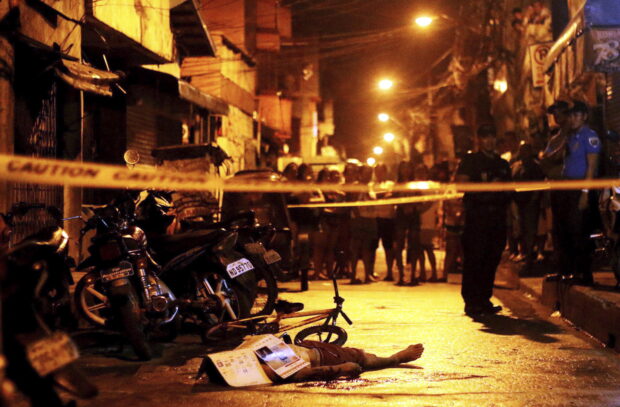UN experts’ call for end to drug war backed

Police officers stand guard near the body of a Aldrin De Guzman killed on drug related shooting incident by riding-in-tandem in Guyabano Street, Barangay Napico, Manggahan, Pasig City, in February 2017. (File photo by RICHARD A. REYES / Philippine Daily Inquirer)
The government must help the families of drug war victims during the previous administration amid calls for the cessation of its bloody campaign, which has mostly victimized the poor and marginalized, opposition Sen. Risa Hontiveros said on Tuesday.
In a statement, Hontiveros backed the appeal of United Nations human rights experts for member states to end the so-called “war on drugs,” as she vowed to push in the Senate for a review of the government’s existing antidrug policies.
“As we continue to seek justice and accountability for the victims of the war on drugs, we expect that the current administration will unite and cooperate to give justice to the victims of the war on drugs, review the current policies toward a more comprehensive, inclusive, humane and just drug response, and promote a community-based drug prevention [approach] and voluntary treatment and rehabilitation,” she said.
Hontiveros made the statement in reaction to a resolution released by a group of UN human rights experts which called for an end to the global “war on drugs” as the world marked International Day against Drug Abuse and Illicit Trafficking on June 26.
The “war on drugs” may be understood as a “war on people,” they said.
Article continues after this advertisement“Its impact has been greatest on those who live in poverty, and it frequently overlaps with discrimination directed at marginalized groups, minorities and indigenous peoples,” they added.
Article continues after this advertisementFor the United Nations Office on Drugs and Crime (UNODC), the government should invest in evidence-based prevention and health-based strategies for people battling substance abuse to shift the focus to rehabilitation from retribution.
This way, the stigma and discrimination against them would be eliminated and they would get access to the appropriate health and social support services.
Ineffective
“Those who are affected by drug use disorders are not the perpetrators of these problems. They are the victims,” UNODC executive director Ghada Waly said in a statement.
“We are calling for drug responses that are rooted in empathy, built on science, and focused on people,” she said.
The Inquirer sought the comments of administration Senators Francis Tolentino and Ronald dela Rosa but they did not reply. Tolentino heads the committee on justice and human rights, while Dela Rosa chairs the committee on public order and dangerous drugs.
Hontiveros, for her part, agreed with the UN experts’ call. “I am one with the victims of the war on drugs in their search for justice and the conduct of an evidence-based and gender-inclusive policy,” she said.
Based on official figures, the country has posted a drug use prevalence rate of 2.05 percent, which is equal to about 1.7 million Filipinos, Hontiveros said.
Based on the country’s experience from the Duterte drug war, the “law enforcement-heavy approach” was ineffective, she stressed, adding that it [created] opportunities for human rights abuses and violations, and further [aggravated] the situation of the marginalized communities living in poverty.”
Noting that drug-related killings have not stopped under the Marcos administration, she said she and other lawmakers would continue to review and enact new drug policies anchored on “harm reduction principles and the human rights of all.”